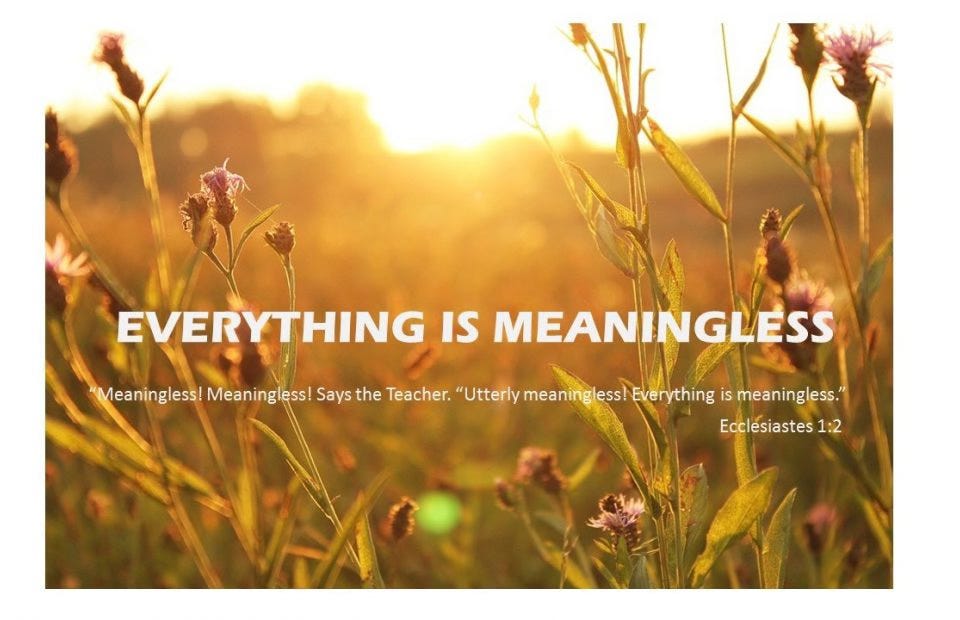“To everything there is a season, a time for every purpose under heaven: a time to be born and a time to die…a time to weep and a time to laugh; a time to mourn and a time to dance.”
You’ve heard it at every funeral and thought to yourself “wow, that’s profound” and then, inevitably, forgot about it until the next time you heard it, which ironically was probably at another funeral.
I won’t say that Ecclesiastes is one of my favorite books (because it’s not), but the idea of the book and why it was written is something that I like to remind myself of on my worst days.
The author, who we will discuss below, was essentially having the largest pity party of all time. The worst part? He wrote his pity party down, with all of his sad emotions, and now it has a permanent place among literature.
When you were growing up, I’m sure your siblings or parents would pretend to play a tiny violin when you were throwing yourself a pity party.
This is 10x worse.
Embarrassing.
But yes, Ecclesiastes is just saying “woe is me, I am sad, everyone be sad for me” and I love it.
A FEW THINGS TO THINK ABOUT WHEN YOU READ THE PITY PARTY BOOK:
1) The title of Ecclesiastes makes ZERO sense.
Ecclesiastes is named after the Latin translation of preacher from the first verse.
“The words of the Preacher, the son of David, king in Jerusalem.”
In Hebrew, the book is called Kohelet (pronounced koh-heh-leth) which is roughly translated as assembly or someone who talks to an assembly (i.e. a preacher).
In other words, this book has been viewed as the OG Sunday Sermon. Had the Rev. Dr. had a say in what this book would be called, I probably would have chose Death Becomes Him. Or maybe even Four Deaths and a Funeral.
2) We don’t know for sure WHO wrote it.
Was it Solomon? Was it a sage or group of sages?
“Sages??”
Yes. An ancient term meaning someone who philosophizes. Someone who has wisdom. Someone who likes to teach and pass down said wisdom.
Sages were huge in the ancient Near East. They had students (think like a Rabbi) and were used solely to remind their cultures of morals and basic values. Whether or not it was sages who wrote Ecclesiastes, much of the book shows that the author was aware of the work of sages.
3) Read it all at once, if possible.
It’s 12 poetic chapters, all of which are very short.
You don’t need to read it in sections. There is no order or organization in this book. Everything is just out in the open for you to read, and then either shake your head or get some tears out. Both options are quite cathartic.
Don’t read the book thinking it’ll cheer you up. Don’t read the book on a Monday. It will not lift your spirits or inspire you… unless you have a real and incredibly firm grasp on reality.
4) There are TWO focuses: death and fearing God.
If I was to sum up Ecclesiastes in one sentence, it would be “what’s the point, we all die someday.”
Chapter 12 is a touch of nostalgia ("Remember now your Creator in the days of your youth, before the difficult days come and the years draw near when you say ‘I have no pleasure in them.’”) along with the “death is inevitable” not-so-subtle motif.
A very common sentiment among people who are in distress, AND for the ancient peoples.
There was an Egyptian papyrus found (Berlin Papyrus 3024) with a poem: “Death is before me today, like a sick man’s recovery, like going outdoors after confinement.” See? Common theme.
The ultimate reason for the sad talk about death was to reflect on death in a very normalized way. I don’t think I’m alone when I say that culture today teaches that death is a bit of a taboo subject, which I find humorous considering it’s the debt that all men pay (National Treasure 2, anyone?).
Ancient cultures had a much firmer grasp on taboo subjects, as we will unfortunately ALSO talk about in the next Basics Substack (*cough* Songs of Solomon).
As far as the “fearing God” part, the author makes a very clear point through all 12 chapters that it is vital to fear God in this confusing world (if you have forgotten what fearing God means, you can read one of my last Substacks that goes into it). Chapter 5 says that fearing God is important when:
“…dreams increase and words grow many, there is vanity (emptiness or no meaning), but God is the one you must fear.”
CliffNotes version? Death is eminent. Prolong it by respecting God and remaining optimistic in times of strife.
5) And, finally, the Rev. Dr.’s favorite line.
“Everything is meaningless!”
The word meaningless (or if you are reading the KJV vanity) is used 30 times in Ecclesiastes. Something to think about anytime you feel sad or having a woe is me moment…at least your woe is me moment isn’t recorded for all of humanity.
That’s Ecclesiastes. Not so bad, right?
Go read with confidence. Thanks for being here.





